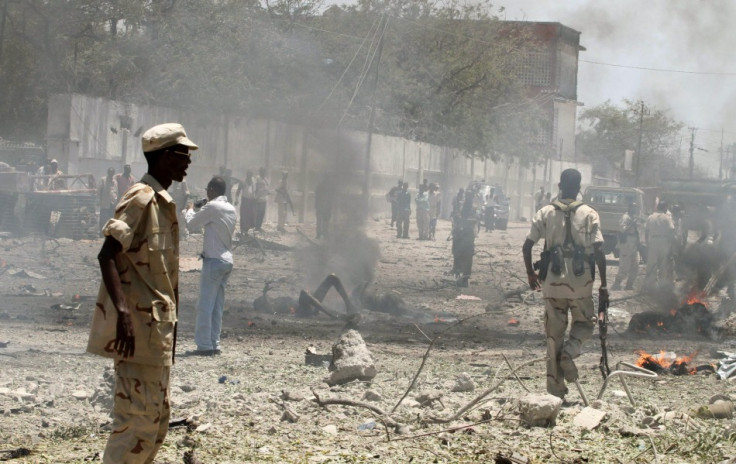Mogadishu Car Bomb Shows Somalia Needs to Be a Priority For both The UN and the AU

Al-Shabab Militants detonated a car bomb in Somalia Tuesday in front of the education ministry in Mogadishu, killing at least 70 people and wounding dozens, according to officials, killing said. Among the dead were students and parents.
The attack is the biggest to take place in Somalia's capital since al-Shabab was forced to withdraw most of its forces in August following an offensive by the African Union and the transitional government's forces.
A truck, loaded with explosives blew up after coming to a halt at a security checkpoint at the entrance to the Ministry of Education, said Ali Hussein, a police officer in Mogadishu.
"The number of people killed is 57 and about 34 are unaccounted for," the AFP also reported a police official speaking on condition of anonymity as saying. "We fear that the number of dead could rise."
The capital, is already struggling to cope with thousands of displaced people affected by famine, and security issues are now rising.
Witnesses of the attacks Ay many of the wounded suffer horrific injuries and the death toll is set to increase by the hour.
said they were treating people with horrific wounds, including amputated limbs, burns, and patients who became blinded.
"It is the most awful tragedy I have ever seen," Ali Abdullahi, a nurse at Medina hospital told the AFP.. "Imagine dozens are being brought here minute by minute. Most of the wounded people are unconscious and others have their faces blackened by smoke and heat."
"The explosion has not only affected the targeted place, but even passer-by people and car passengers died there. The death toll may increase and we are still carrying many dead bodies" he added.
Earlier on the government issued a statement estimating the death toll to 15 but it remains unclear if it was an early count.
"The casualties are mostly students and parents who were waiting for results of scholarships from the Ministry of Higher Education," the government said. "
The attack shows that the danger from terrorists is not yet over and that there are obviously still people, who want to derail the advances that the Somali people have made towards peace."
Al-Shabab immediately claimed responsibility for the attack on a website writing:
"Our Mujahedeen fighters have entered a place where ministers and AMISOM foreigners stay," al-Shabab said in a brief post on a website, referring to the African Union (AU) peacekeeping mission.
Al-Shaba has this week upped its insurgency after they had abandoned their positions in Mogadishu in early August.
They had at the time vowed their withdrawal was a tactical measure to regroup and launched new attacks.
Sucide bombings were quasi-inexistent in Somalia prior to 2007, but recent developments prove insurgents are now reverting to using guerrilla tactics used by al-Qaeda militants.
Monday, they also launched an attack, targeting in the city of Dhusamareb, known to be the main stronghold of Ahlu Sunna wal Jamaa, a Sufi militia allied to the government.
Violence was also reported in Dhobley, a town on Somalia's southern border with Kenya.
"The renewed clashes are between opposing armed groups and are further exacerbating the already severe humanitarian situation," said Adrian Edwards, spokesman for the UN High Commissioner for Refugees.
"We have received initial, unconfirmed reports of deaths and scores of injured people," he added.
Dhobley is controlled by the self-declared state of Azania, an anti-Shebab militia reportedly backed by Kenya to create a buffer zone along the troubled frontier.
In 2010, Al-Shabab also claimed responsibility for a double suicide bombing in Uganda in that killed 76 people and in 2009, a suicide bomber attacked a university graduation ceremony in Mogadishu, killing 24 people.
Somalia has been plagued by anarchy and poverty for the last two decades as the UN bac ked transitional government has struggle to impose its authority on the territory and the country remains deeply fractioned.
Famine is also crippling the nation, with many of the most affected areas being controlled by al-Shabab.
The U.N. estimates tens of thousands have died from the famine in the horn of Africa and that 750,000 people are in danger of dying over the next few months.
With al-Shabab now upping their insurgency attacks, the UN Security Council has called on the African Union to increase its 9,000 troops fighting alongside the Somali government.
After suffering twenty years of lawlessness and insecurity with a transitional government barely managing to survive while state institution have kept on crumbling, and with yet another famine, surely Somalia should be a priority for both the UN and the AU.
© Copyright IBTimes 2025. All rights reserved.




















